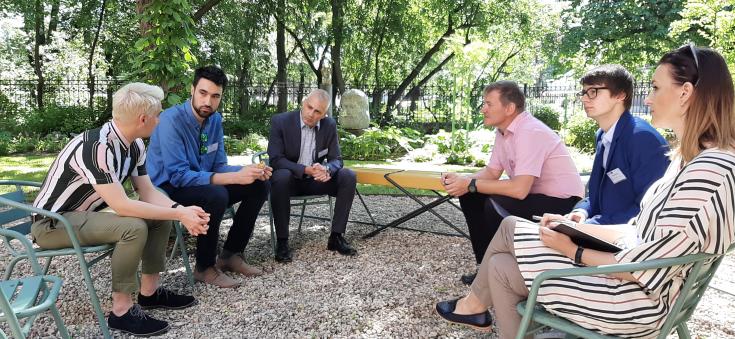Solidarity tourism – different ways to discover a territory

Let's say you are planning a first-time vacation to Paris. What would be on your itinerary? The Eiffel Tower, the Louvre and Arc de Triomphe for sure. Perhaps also the Orsay Museum or Musée de l'Orangerie. If it is your first time in the region, you might venture to Versailles Castle.
All of them are well-known landmarks that convey a specific history and story. But what about the history of migration to Paris and the stories related to exile and welcoming? What about getting a sense of different neighbourhoods and their distinct social and cultural practices?
You always have two types of histories. One is the grand narrative put down in history books and stored in museums, whereas the other is the lived experience of individuals and the memories of much more socio-economically and ethnically diverse groups.
Migrant tours
This is what Migrant Tour (FR: Les Passeurs de culture(s)) in Val-de-Marne, Paris, is about. These guided tours focus on the cultural diversity of the districts and cities of the Paris region. But most notably, the tour guides themselves are from migrant communities and thus become so-called "inhabitants-transmitters of culture."
The program is based on the memory of the territory's inhabitants. It aims to develop solidarity tourism as a vector of links between the territory and its inhabitants, to change how people look at each other and thus promote the citizenship of migrants.
The migrant tour guides help interpret a neighbourhood's social and cultural practices to improve mutual understanding between the inhabitants and provide an alternative perspective to visitors.
These walks reveal the cultural, social and economic richness of migrations in Val-de-Marne, illustrating it through urban heritage routes and personal life journeys.
In a broader sense, solidarity tourism is a form of sustainable tourism that is about solidarity with the people and natural resources that are often overexploited by the tourism industry.
Programme set-up
The Migrant Tour was a three-month training program delivered free of charge to residents of Val-de-Marne that led to the creation of guided tours. The goal was to train representatives of migrant communities to become tour guides in and of their local area.
The program also contributed to integrating these individuals into local society and sometimes helped them with their administrative procedures and job searches.
The University of Paris-Descartes - Sociology and Ethnology Unit, INALCO (Language institute) and the Museum of the History of Immigration provided the training. The courses touched upon aspects such as how to transmit memories as well as testimonies from the residents.
The Val-de-Marne Tourism Board, partner in the STAR Cities project where this practice was identified, also supported the training programme throughout the process. The training of guides cost a total of 15,000 €, which was co-financed by Val-de-Marne County Council. In one year, 12 tours guided by migrant guides were organised for tourists and inhabitants of Val-de-Marne, for a total of 92 visitors.
Manifold benefits
Similar migrant tours can be set up relatively cheaply all over Europe and achieve multiple objectives at once.
First, such tours can be used as a part of labour market initiatives and to help train and employ members of the migrant community who might have had trouble finding a steady job.
Secondly, it is a social undertaking that can improve mutual understanding and respect within a community. This can be especially relevant at times like now, when millions of Ukrainian refugees across the union are integrating into our communities and forming their own. According to the European Council, as of September 2023, 4.2 million people from Ukraine were benefitting from the temporary protection mechanism.
And lastly, it can be one of many tourism products/offers provided by a local tourism board. Solidarity tourism, as a form of alternative and sustainable tourism, is becoming more popular and more visitors are looking for such services.